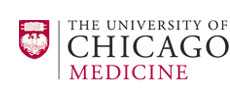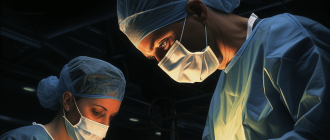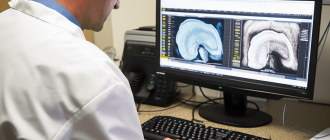Debates in MALS Treatment: Is Surgery Always Necessary?

MALS, or median arcuate ligament syndrome, is a condition characterized by the compression of the celiac artery by the median arcuate ligament. This compression can lead to chronic abdominal pain and other symptoms, making treatment necessary for affected individuals. However, there is ongoing debate in the medical community regarding whether surgery is always the best course of treatment for MALS.
One argument against surgery is that not all patients with MALS experience significant symptoms. Some individuals may have a mild or asymptomatic form of the condition, in which case surgery may not be necessary. Instead, conservative management options, such as dietary changes and medications, can be explored to alleviate symptoms and improve quality of life.
On the other hand, proponents of surgery argue that it can provide long-term relief for MALS patients who are severely impacted by their symptoms. Surgery involves cutting the ligament that compresses the celiac artery, thereby relieving the pressure and improving blood flow to the digestive organs. For these individuals, surgery may be the most effective and lasting treatment option available.
Overall, the decision to pursue surgery for MALS treatment is a complex one that should be tailored to the specific needs and symptoms of each patient. The ongoing controversies in the field highlight the importance of a multidisciplinary approach, involving gastroenterologists, surgeons, and other specialists, to ensure that the most appropriate and beneficial treatment plan is developed for each individual with MALS.
Understanding MALS: Causes and Symptoms
MALS (Median Arcuate Ligament Syndrome) is a controversial condition that has sparked much debate in the medical community. The debates surrounding the causes and treatment of this syndrome have led to conflicting opinions on whether surgery is always necessary or if conservative treatment options can be effective.
MALS is a rare disorder that occurs when the median arcuate ligament, a band of tissue that connects the diaphragm to the spine, compresses the celiac artery. This compression restricts blood flow to the organs supplied by the celiac artery, such as the stomach, liver, and spleen. This can result in various symptoms and complications.
The exact cause of MALS is still not fully understood. Some theories suggest that it may be caused by anatomical abnormalities, such as an unusually low-lying diaphragm or an elongated median arcuate ligament. Others believe that it could be related to chronic inflammation or autoimmune disorders.
The most common symptom of MALS is chronic abdominal pain, which is usually found in the epigastric region and worsens after meals. Other symptoms may include weight loss, nausea, vomiting, diarrhea, and a feeling of fullness after eating small amounts of food.
Diagnosing MALS can be challenging, as the symptoms are similar to those of other gastrointestinal disorders. A comprehensive evaluation that includes medical history, physical examination, imaging tests, and functional studies is usually necessary to confirm the diagnosis.
Treatment options for MALS include conservative measures and surgical intervention. Some conservative treatment options include dietary modifications, pain management, and physical therapy. However, surgery is often considered the most effective treatment, especially in severe cases where symptoms are debilitating and conservative measures have failed.
There is ongoing debate regarding the necessity of surgery for all MALS patients. Some argue that surgery should be reserved for patients with severe symptoms, while others believe that surgery should be the first-line treatment to prevent potential complications and improve quality of life.
- In conclusion, MALS is a complex condition with no definitive cause, and its treatment remains a topic of controversy in the medical community. The decision to pursue surgery should be made on a case-by-case basis, considering the severity of symptoms and the response to conservative measures.
Traditional Treatment Methods: Medication and Lifestyle Changes
In the debates surrounding the necessity of surgery for the treatment of MALS, traditional non-surgical methods have been explored. These methods primarily involve medication and lifestyle changes aimed at managing symptoms and improving quality of life for patients.
Medication: Medications such as proton pump inhibitors (PPIs) and H2 blockers may be prescribed to reduce the production of stomach acid, which can alleviate some of the symptoms associated with MALS, such as heartburn and stomach pain. These medications work by blocking the enzymes that produce stomach acid, helping to reduce inflammation and irritation in the digestive tract.
Lifestyle Changes: In addition to medication, making certain lifestyle changes can also be beneficial in managing the symptoms of MALS. These changes can include:
- Following a low-fat diet: A low-fat diet can help reduce the amount of fat that the digestive system needs to process, which can alleviate symptoms such as nausea and bloating.
- Eating smaller meals more frequently: Eating smaller meals throughout the day, rather than large meals, can help prevent the stomach from becoming too full, reducing the occurrence of symptoms.
- Avoiding trigger foods: Certain foods, such as spicy or greasy foods, can worsen symptoms in individuals with MALS. By identifying and avoiding these trigger foods, patients can minimize symptom flare-ups.
- Engaging in stress-reducing activities: Stress can exacerbate symptoms of MALS, so engaging in activities such as yoga, meditation, or regular exercise can help reduce stress levels and improve overall well-being.
While medication and lifestyle changes can be effective in managing symptoms, it is important to note that they may not provide a complete solution for all individuals with MALS. Some patients may still experience significant symptoms and a decreased quality of life despite these traditional treatment methods. In such cases, surgery may be considered as a more definitive treatment option.
Emergence of Surgical Treatment: Advancements and Benefits
The treatment of median arcuate ligament syndrome (MALS) has been a subject of ongoing debates and controversies. While non-surgical approaches like medication and lifestyle changes are often the first line of treatment, surgery is necessary in some cases where these conservative methods fail to provide relief or where the condition is severe.
Surgery for MALS has emerged as a viable option due to advancements in medical technology and surgical techniques. With the introduction of laparoscopic surgery, the procedure has become minimally invasive, resulting in shorter hospital stays, reduced scarring, and faster recovery times.
One of the main benefits of surgical treatment for MALS is the potential for long-term relief. While non-surgical methods may provide temporary relief, surgery aims to address the root cause of the syndrome by releasing the compression of the median arcuate ligament on the celiac artery. This can lead to improved blood flow and alleviate the symptoms associated with MALS.
Moreover, surgery has shown promising results in improving the quality of life for patients suffering from MALS. Studies have reported significant improvements in symptoms such as abdominal pain, nausea, weight loss, and postprandial distress following surgical intervention.
Additionally, surgery for MALS offers a more definitive solution compared to non-surgical approaches. While medication and lifestyle changes may alleviate symptoms, they do not provide a permanent solution. Surgery, on the other hand, aims to provide lasting relief by addressing the underlying anatomical issue causing the syndrome.
It is important to note that surgery is not always the first choice or necessary for every MALS patient. The decision to pursue surgical treatment should be made after careful consideration of individual factors, such as the severity of symptoms, response to non-surgical treatments, and overall health condition. A thorough evaluation by a medical professional specialized in MALS is crucial in determining the best course of action.
Advancements in Surgical Techniques for MALS
The surgical treatment for MALS has seen advancements in recent years, leading to improved outcomes and patient satisfaction. One of the key advancements is the use of laparoscopic techniques, also known as minimally invasive surgery.
Laparoscopic surgery involves making small incisions and using a thin, flexible tube with a light and camera (laparoscope) to visualize and perform the procedure. This technique offers several advantages over traditional open surgery, including reduced postoperative pain, shorter hospital stays, faster recovery times, and minimal scarring.
Another advancement in surgical techniques for MALS is the use of robotic-assisted surgery. This approach allows for enhanced precision and control for the surgeon, resulting in improved outcomes. Robotic-assisted surgery is particularly beneficial in complex cases where the anatomy is challenging or when a more thorough dissection is required.
Conclusion
The emergence of surgical treatment for MALS has provided a valuable option for patients who do not respond to non-surgical approaches or have severe symptoms. Advancements in surgical techniques, such as laparoscopic and robotic-assisted surgery, have further improved outcomes and patient satisfaction. However, it is important to consider individual factors and seek the guidance of a medical professional specialized in MALS to determine the most suitable treatment approach.
Analysis of Medical Studies and Research on MALS Surgery
The treatment of median arcuate ligament syndrome (MALS) has always been a topic of debate in the medical community. While some argue that surgery is not always necessary for MALS, others believe that it is the most effective treatment option. To understand the controversy surrounding MALS surgery, it is crucial to analyze the medical studies and research conducted on this topic.
Several studies have investigated the effectiveness of surgical intervention for MALS. These studies have shown that surgical release of the median arcuate ligament can provide significant relief from symptoms in a majority of cases. Patients who underwent surgery experienced a decrease in abdominal pain, improved quality of life, and reduced need for pain medication.
However, there are also studies that suggest that surgery may not be necessary for all patients with MALS. These studies have found that some individuals with mild symptoms may find adequate relief through conservative treatments, such as dietary modifications, pain management, and physical therapy. These findings have sparked debates about the appropriateness of surgical intervention in all cases of MALS.
Another aspect of the controversy surrounding MALS surgery is the variability in surgical outcomes. While some patients experience long-term relief from symptoms after surgery, others may not experience significant improvement or may even develop new symptoms. These differences in outcomes highlight the complexity of MALS and the need for individualized treatment approaches.
Moreover, the lack of standardized diagnostic criteria for MALS contributes to the ongoing debates regarding surgery. Accurate diagnosis of MALS is essential for determining the appropriateness of surgical intervention. However, the criteria for diagnosing MALS vary among medical professionals, leading to discrepancies in treatment recommendations.
In conclusion, the analysis of medical studies and research on MALS surgery reveals ongoing debates about the necessity of surgery for all cases of MALS. While surgical intervention has shown promising results in providing symptom relief for many patients, there is also evidence suggesting that conservative treatments may be sufficient in some cases. The variability in surgical outcomes and the lack of standardized diagnostic criteria further complicate the decision-making process. The individualized approach to MALS treatment, considering the severity of symptoms and individual patient factors, remains crucial in determining whether surgery is necessary.
Controversies in MALS Surgery Effectiveness: Patient Satisfaction Surveys
The treatment of median arcuate ligament syndrome (MALS) has always been a subject of debate among medical professionals. While some argue that surgery is necessary to effectively treat MALS, others believe that alternative treatment options can be equally effective. Patient satisfaction surveys provide valuable insight into the effectiveness of MALS surgery and help shed light on the ongoing debates surrounding its necessity.
By surveying patients who have undergone MALS surgery, researchers can gather information on their level of satisfaction with the treatment outcome. This data can then be compared to the satisfaction levels of patients who have chosen alternative treatment options, such as medication or lifestyle changes. Through this comparison, researchers can assess whether MALS surgery is consistently associated with higher levels of patient satisfaction.
One way to measure patient satisfaction is through the use of standardized scales, such as the Patient-Reported Outcomes Measurement Information System (PROMIS) scale. This scale allows patients to rate various aspects of their treatment experience, including pain relief, functional improvement, and overall quality of life. By analyzing the scores on these scales, researchers can determine whether MALS surgery leads to significant improvements in patient satisfaction.
In addition to standardized scales, open-ended questions can also provide valuable insights into patient satisfaction. Patients can express their opinions, concerns, and experiences in their own words, providing a more nuanced understanding of their satisfaction levels. These qualitative responses can help identify specific areas of concern or improvement related to MALS surgery.
Furthermore, patient satisfaction surveys can also assess the long-term effectiveness of MALS surgery. By following up with patients months or even years after their surgery, researchers can determine whether the initial satisfaction reported by patients remains stable over time. This information can help gauge the lasting impact of MALS surgery on patient well-being.
Overall, patient satisfaction surveys play a crucial role in understanding the effectiveness of MALS surgery and addressing the controversies surrounding its necessity. By collecting data on patient satisfaction levels, researchers can contribute to the ongoing debates and provide valuable insights for both medical professionals and patients considering treatment options for MALS.
Risks and Complications associated with MALS Surgery
MALS surgery, also known as MALS decompression surgery, is a procedure that involves relieving the pressure on the celiac artery by cutting the ligament that compresses it. While the surgery is often necessary for patients with Median Arcuate Ligament Syndrome (MALS), there are debates surrounding its risks and complications.
Potential risks of MALS surgery include:
- Infection: As with any surgical procedure, there is a risk of infection at the incision site. Proper post-operative care and hygiene can help mitigate this risk.
- Bleeding: Surgery always carries a risk of bleeding, and MALS surgery is no exception. Surgeons take precautions to control bleeding during the procedure, but there is always a possibility of excessive bleeding.
- Nerve damage: MALS surgery involves releasing the ligament and manipulating surrounding tissues. This can potentially damage nearby nerves, leading to numbness, weakness, or other neurological complications.
- Organ damage: The celiac artery is located in close proximity to other organs, such as the pancreas and spleen. During MALS surgery, there is a risk of inadvertently damaging these organs, which can result in further complications.
- Adverse reaction to anesthesia: Some patients may experience allergic reactions or other complications related to anesthesia during MALS surgery.
Complications associated with MALS surgery may include:
- Recurrence of symptoms: Despite the surgery, some patients may experience a recurrence of MALS symptoms. This could be due to inadequate decompression of the celiac artery or other factors.
- Chronic pain: Post-surgical pain is common with any surgery, including MALS surgery. In some cases, patients may develop chronic pain that persists long after the surgery.
- Digestive issues: There have been reports of patients experiencing digestive problems, such as nausea, vomiting, and abdominal discomfort, after MALS surgery.
- Scar tissue formation: Following surgery, the body naturally forms scar tissue to heal the incision site. However, excessive scar tissue formation can lead to complications such as adhesions or strictures.
- Possible need for additional surgery: In certain cases, MALS surgery may not completely resolve the issue, requiring further surgical interventions or alternative treatments.
It is important for patients considering MALS surgery to carefully weigh the potential risks and benefits, and to discuss their individual case with a healthcare professional.
Exploring Alternative Treatment Options for MALS
While surgery is often considered necessary in the treatment of MALS, there are ongoing debates regarding the best course of action for patients. Some argue that surgery is the most effective way to relieve symptoms and improve quality of life, while others believe that alternative treatment options should be explored before resorting to invasive procedures.
Non-Surgical Options:
- Medications: In some cases, medications such as pain relievers or muscle relaxants may be prescribed to help manage the symptoms associated with MALS. These medications can provide temporary relief, but they are not a long-term solution.
- Physical Therapy: Physical therapy can be effective in strengthening the abdominal muscles and improving overall core strength, which can help alleviate some of the symptoms of MALS. However, it may not fully address the underlying issue of compression.
Nutritional Therapy:
- Dietary Changes: Making dietary changes, such as avoiding trigger foods or adopting a low-fat, high-protein diet, may help reduce symptoms for some individuals with MALS. However, the effectiveness of dietary changes can vary from person to person.
- Supplements: Some individuals find relief from symptoms by taking certain supplements, such as omega-3 fatty acids or digestive enzymes. However, more research is needed to determine the effectiveness of these supplements in treating MALS.
Interventional Radiology:
In recent years, interventional radiology techniques have been explored as an alternative treatment option for MALS. These minimally invasive procedures focus on opening up the compressed artery using techniques such as angioplasty or stenting. While these procedures can provide relief from symptoms, their long-term effectiveness is still being evaluated.
Conclusion:
While surgery is often considered the most effective treatment for MALS, it is not the only option. Non-surgical approaches, such as medications, physical therapy, and dietary changes, can provide relief for some individuals. Additionally, interventional radiology techniques show promise as an alternative to surgery. However, it is important for patients to consult with their healthcare providers to determine the best course of treatment based on their individual needs and circumstances.
The Role of Diet and Nutrition in MALS Management
MALS (Median Arcuate Ligament Syndrome) is a condition characterized by compression of the celiac artery by the median arcuate ligament, causing symptoms such as abdominal pain, nausea, and weight loss. While surgery is always considered the primary treatment option for MALS, there are ongoing debates about whether it is necessary in all cases. In addition to surgical intervention, diet and nutrition play a crucial role in managing MALS and improving overall patient outcomes.
Individuals with MALS may experience reduced blood flow to the digestive organs, leading to impaired digestion and nutrient absorption. Therefore, a well-balanced and nutrient-dense diet is essential to support the body’s nutritional needs and promote healing.
Dietary Guidelines for MALS Patients:
- Eat small, frequent meals: Consuming smaller meals throughout the day can help alleviate symptoms related to poor blood flow and promote better digestion. This approach can also prevent excessive stretching of the stomach, which may worsen abdominal pain.
- Focus on easy-to-digest foods: Opt for foods that are easier for the digestive system to process, such as cooked vegetables, lean proteins, and whole grains. These foods are generally less likely to cause discomfort and provide essential nutrients.
- Avoid triggers: Certain foods and beverages can exacerbate MALS symptoms. Common triggers include spicy foods, fatty foods, caffeine, and alcohol. It is important to identify and avoid these triggers to minimize discomfort and promote better digestive health.
- Stay hydrated: Drinking an adequate amount of water is vital for proper digestion and overall health. Aim to consume at least 8 glasses of water per day, unless otherwise advised by a healthcare professional.
- Consider nutritional supplements: In some cases, MALS patients may require additional nutritional support through supplements. This may include multivitamins, iron supplements, or specialized formulas prescribed by a healthcare professional.
It is important for individuals with MALS to work closely with a healthcare professional or registered dietitian to develop a personalized dietary plan that meets their specific needs and takes into account any other underlying health conditions.
The Role of Nutrition in Non-surgical Management:
While surgical intervention is often necessary for individuals with severe or worsening MALS symptoms, some patients may opt for non-surgical management. In these cases, proper nutrition becomes even more critical. Through dietary modifications, individuals can alleviate symptoms and potentially avoid surgery altogether.
Nutrition interventions may include avoiding trigger foods, managing portion sizes, and optimizing nutrient intake. Working with a healthcare professional is crucial in determining the most appropriate nutritional approach for non-surgical MALS management.
| Pros of Diet and Nutrition Management | Cons of Diet and Nutrition Management |
|
|
Ultimately, the role of diet and nutrition in managing MALS should not be overlooked. While surgery may be necessary for some cases, a comprehensive approach that includes dietary modifications can greatly improve symptoms and overall quality of life for individuals living with MALS.
Psychotherapy for MALS Patients: A Promising Approach
The debates surrounding the necessity of surgery in the treatment of Median Arcuate Ligament Syndrome (MALS) have sparked discussions among medical professionals and researchers. While surgery has traditionally been viewed as the primary treatment option for MALS patients, recent studies have suggested that psychotherapy could be a viable alternative.
Is surgery always necessary?
One of the main points of contention in the MALS treatment field is whether surgery is always necessary for patients. While surgery can provide relief for some individuals, it is important to consider the potential risks and side effects associated with invasive procedures.
Exploring alternatives: Psychotherapy
A promising approach to MALS treatment is psychotherapy. By addressing the mental and emotional aspects of the condition, psychotherapy aims to help patients cope with their symptoms and improve their overall well-being.
Psychotherapy can provide MALS patients with tools and strategies to manage pain, anxiety, and stress associated with the condition. Through techniques such as cognitive-behavioral therapy and relaxation exercises, patients can learn to change negative thought patterns, reduce stress levels, and improve their quality of life.
Benefits of psychotherapy for MALS patients
There are several potential benefits of incorporating psychotherapy into the treatment plan for MALS patients:
- Improved pain management: Psychotherapy can help MALS patients develop coping mechanisms to effectively manage pain symptoms.
- Enhanced emotional well-being: By addressing the psychological impact of MALS, psychotherapy can improve patients’ overall emotional well-being and quality of life.
- Reduced reliance on medication: Learning alternative strategies for coping with symptoms can potentially reduce the need for medication and its associated side effects.
- Increased self-efficacy: Psychotherapy can empower MALS patients to take an active role in managing their condition, improving their sense of control and self-efficacy.
The role of psychotherapy in the MALS treatment landscape
While surgery is a valid and effective treatment option for some MALS patients, the inclusion of psychotherapy in the treatment plan can provide additional support and benefits. It is important for healthcare professionals to consider a multidisciplinary approach that addresses both the physical and psychological aspects of MALS.
Further research is needed to explore the effectiveness of psychotherapy as a standalone treatment or in combination with surgery for MALS patients. By understanding the potential benefits and limitations of psychotherapy, healthcare professionals can offer comprehensive and personalized treatment options to MALS patients.
Integrative Medicine in the Treatment of MALS
In the controversial field of treating Median Arcuate Ligament Syndrome (MALS), surgery is not always necessary. The use of integrative medicine methods can provide effective relief and potentially avoid the need for invasive surgery.
Integrative medicine is an approach that combines both conventional and complementary therapies to address the underlying causes of a condition. In the case of MALS, this approach focuses on relieving the compression of the celiac artery caused by the median arcuate ligament.
One of the primary components of integrative medicine in the treatment of MALS is dietary modifications. Certain foods can exacerbate symptoms and contribute to the compression of the celiac artery. By eliminating or reducing the intake of these foods, patients can experience a significant reduction in symptoms.
Additionally, various mind-body techniques, such as relaxation exercises, deep breathing, and yoga, have shown promising results in relieving the stress and tension associated with MALS. These techniques help to relax the muscles surrounding the celiac artery and improve blood flow, reducing the symptoms of MALS.
Furthermore, the use of herbal supplements and nutritional therapies can provide additional support to patients with MALS. Certain herbs, such as ginger and turmeric, have anti-inflammatory properties that can help reduce inflammation in the celiac artery and alleviate symptoms. Nutritional therapies, such as vitamin supplementation and omega-3 fatty acids, can also help to promote a healthy vascular system.
While surgery may be necessary in some severe cases of MALS, integrative medicine offers a non-invasive and holistic approach that can be beneficial for many patients. By addressing the underlying causes of MALS through dietary modifications, mind-body techniques, and herbal supplements, patients may be able to avoid surgery and find relief from their symptoms.
Future Perspectives and Innovations in MALS Treatment
As debates continue on whether surgery is necessary for the treatment of Median Arcuate Ligament Syndrome (MALS), researchers and medical professionals are constantly exploring new perspectives and innovations to improve treatment outcomes for patients.
While surgery has traditionally been the go-to treatment option for MALS, there is a growing interest in alternative approaches that may avoid the need for invasive procedures. These approaches can include conservative measures such as lifestyle modifications, dietary changes, and physical therapy.
One future perspective in MALS treatment lies in the advancement of non-invasive imaging techniques. Imaging modalities such as magnetic resonance angiography (MRA) and computed tomography angiography (CTA) are constantly evolving, providing more accurate and less invasive ways to diagnose MALS. These advancements can improve the accuracy of diagnosis, leading to better treatment decisions.
Additionally, researchers are investigating the use of novel pharmacological therapies to manage the symptoms associated with MALS. These therapies target different aspects of the disease, such as reducing inflammation or improving blood flow, and may offer a non-surgical treatment option for patients who are not suitable candidates for surgery.
Furthermore, ongoing research is focused on identifying specific subgroups of patients who may benefit more from surgical intervention. By understanding the underlying mechanisms and characteristics of MALS, medical professionals can tailor treatment plans to individual patients, ensuring optimal outcomes.
Another potential innovation in MALS treatment lies in the field of minimally invasive surgery. While surgery is currently the gold standard treatment option, advancements in surgical techniques, such as the use of laparoscopy or robotic-assisted surgery, may provide a less invasive alternative with faster recovery times and improved patient satisfaction.
It is important to note that the future perspectives and innovations in MALS treatment are constantly evolving. As new research emerges and our understanding of the disease improves, treatment options may continue to expand. Ultimately, the goal is to provide patients with effective and tailored treatment approaches that are both safe and beneficial.
Holistic Approach to MALS Management and Enhanced Quality of Life
MALS, or Median Arcuate Ligament Syndrome, is a rare and often controversial condition that affects the celiac artery, causing chronic abdominal pain and other related symptoms. While surgery is frequently seen as the go-to treatment for MALS, there are debates regarding the necessity and efficacy of surgical intervention in all cases.
However, some experts argue that a holistic approach to MALS management can provide significant benefits and enhanced quality of life for patients. This approach focuses on non-surgical interventions and therapies that aim to alleviate symptoms, improve overall well-being, and reduce the need for invasive procedures.
One key aspect of the holistic approach is lifestyle modification. This involves dietary changes, stress management techniques, and regular exercise. A healthy diet that is low in processed foods and high in fruits, vegetables, and whole grains can help reduce inflammation and improve digestion. Stress management techniques such as meditation, yoga, or therapy can help patients cope with the chronic pain and anxiety associated with MALS. Regular exercise, tailored to the individual’s capabilities, can improve blood circulation and overall stamina.
In addition to lifestyle modifications, patients can benefit from complementary therapies. This includes acupuncture, massage therapy, and chiropractic care. These therapies can help relieve pain, reduce tension, and improve overall well-being. It is important for patients to work closely with a healthcare provider to determine which complementary therapies are appropriate for their specific needs.
Furthermore, a holistic approach to MALS management should also include psychological support. Chronic pain can have a significant impact on an individual’s mental health and overall quality of life. By providing counseling, support groups, or access to mental health professionals, patients can learn coping mechanisms and receive the emotional support they need to navigate the challenges of living with MALS.
It is important to note that a holistic approach does not completely eliminate the need for surgery in some cases of MALS. However, by adopting a comprehensive and patient-centered approach to management, patients may experience an enhanced quality of life and potentially reduce the need for invasive procedures.
Summary of the Holistic Approach to MALS Management:
| Key Components | Benefits |
| Lifestyle Modifications | Reduces inflammation, improves digestion, and overall well-being |
| Complementary Therapies | Relieves pain, reduces tension, and improves overall well-being |
| Psychological Support | Helps cope with chronic pain and improves mental health |
While surgery is not always necessary for the treatment of MALS, a holistic approach can provide significant benefits and an enhanced quality of life for patients. By incorporating lifestyle modifications, complementary therapies, and psychological support into the management plan, patients with MALS can take control of their condition and improve their overall well-being.
Seeking Expert Medical Advice: Choosing the Right Surgeon
When considering treatment options for MALS, surgery is often an option that is recommended by medical professionals. However, it is not always necessary or the best choice for every patient. If surgery is deemed necessary, it is important to choose a skilled and experienced surgeon to ensure the best possible outcome.
Here are some factors to consider when seeking expert medical advice and choosing the right surgeon for MALS treatment:
- Specialization and Experience: Look for a surgeon who specializes in treating MALS. They should have extensive experience in performing surgeries for this condition, as well as a high success rate. It is important to ask about their experience, including the number of MALS surgeries they have performed and their patient outcomes.
- Qualifications and Board Certification: Ensure that the surgeon is board-certified and has the necessary qualifications and credentials to perform MALS surgery. Board certification signifies that the surgeon has met specific standards of training and expertise in their area of specialization.
- Reputation and Referrals: Seek recommendations from trusted healthcare professionals, such as your primary care physician or gastroenterologist. Additionally, consider seeking referrals from other MALS patients who have undergone surgery. Their firsthand experiences can provide valuable insights into the surgeon’s skills, bedside manner, and overall quality of care.
- Communication and Trust: Schedule a consultation with the surgeon to discuss your condition, treatment options, and any concerns or questions you may have. Pay attention to how they communicate with you, the level of trust they inspire, and how well they listen to your needs. A good surgeon should take the time to thoroughly explain the surgical procedure, potential risks, and expected outcomes.
- Hospital and Surgical Team: Consider the hospital where the surgery will be performed and the support staff that will be involved. A reputable hospital with a dedicated team of healthcare professionals can contribute to a successful surgical outcome.
- Insurance Coverage and Financial Considerations: It is important to confirm that the surgeon is covered by your insurance plan and to understand the financial aspects of the surgery, such as co-pays, deductibles, and out-of-pocket expenses. Consult with your insurance provider and the surgeon’s office to clarify any financial obligations.
Choosing the right surgeon for MALS treatment is a crucial step in ensuring the best possible outcome. By carefully considering the factors mentioned above and seeking expert medical advice, you can make an informed decision that aligns with your needs and goals. Remember to trust your instincts and choose a surgeon whom you feel comfortable and confident with.
Questions and answers:
What is MALS?
MALS stands for Median Arcuate Ligament Syndrome. It is a rare condition characterized by compression of the celiac artery by the fibrous band of the median arcuate ligament.
What are the symptoms of MALS?
Symptoms of MALS include chronic abdominal pain, weight loss, nausea, diarrhea, and vomiting.
How is MALS diagnosed?
MALS is diagnosed through a combination of medical history, physical examination, and imaging tests such as Doppler ultrasound, CT angiography, and magnetic resonance imaging (MRI).
What are the treatment options for MALS?
The treatment options for MALS include conservative management, such as dietary changes, medication, and pain management, as well as surgical intervention to release the median arcuate ligament and relieve the compression on the celiac artery.
Is surgery necessary for MALS?
The necessity of surgery for MALS is a controversial topic. Some patients may find relief from conservative management, while others may require surgical intervention to alleviate their symptoms.
What is MALS?
MALS (Median Arcuate Ligament Syndrome) is a rare condition characterized by the compression of the celiac artery due to the abnormal positioning of the median arcuate ligament.






